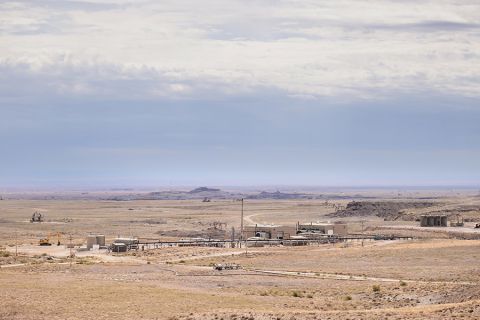
SAN ANTONIO -- Fair-play urging by U.S. trade partners and Congressional support may result in U.S. crude oil exports sooner than in a year, forecast Tom Petrie, chairman of investment banking firm Petrie Partners LLC and formerly a vice chairman of Bank of America Merrill Lynch.
“I think there is a perception there of, if you’re getting that much better on the margin, how serious are you about these challenges involving Russia if you don’t do this?” Petrie said at Hart Energy’s DUG Eagle Ford conference last week. Petrie, who has advised in more than $200 billion of energy mergers and acquisitions transactions, is also the author of Following Oil: Four Decades of Cycle-Testing Experiences and What They Foretell about U.S. Energy Independence (2013).
Reuters reported recently that the U.S. has been urged by, at least, the EU, Mexico and South Korea to export its oil. “… With Asia thirsty for oil to satisfy fuel and petrochemical demand, and Europe anxious to diversify supplies away from Russia, other countries are urging the United States to practice what it has preached for decades: free trade,” Reuters reporters Timothy Gardner and Valerie Volcovici wrote.
Petrie said in the conference that there is both Democratic and Republican support for lifting the oil export ban. “This is a no-brainer.”
He expects the new Congress will introduce a bill in January. “The idea of ‘Well, we’ll just wait for the next president to deal with this’ is not going to fly…The newcomers in January will send a bill to the president and his only option will be to veto it or sign it.
“If he vetoes it, I think there is a decent chance he will be overridden. That would be his legacy if that happens and, at that point I think he will blink and he will sign it--when he realizes there is a good chance it will be overridden.”
Meanwhile, Petrie suspects Saudi Arabia might be preparing to increase its output to depress world oil prices “in order to clip the wings, if you will, of Iran,” which is a higher-cost producer.
“At a Brent oil price of $80--I’m not saying it’s going there--the Saudis can do quite well and Iran would have a bit bigger problem with dealing with their programs, including their nuclear program. So, it may be tempting. It is speculation on my part, but I think it is an informed speculation.
“And, if the Saudis pick their time right, it is when the U.S. embraces exports as well.”
Saudi Arabia increased its daily production this summer to some 10 million barrels (MMbbl)--“in shouting distance of 40-year highs”--and reduced this to 9.7 MMbbl in August, noted Guy Baber, vice president and head of integrated-company research, and Jeff Dietert, managing director and head of research for Simmons & Co. International Inc., in a recent report.
“While some have postulated that very high production from Saudi in recent months is evidence of their efforts to drive the price lower, we do not share this view,” Baber and Dietert reported. They estimated Saudi Arabia needs at least $85 oil to maintain its social programs. “We believe recent behavior from Saudi is more reflective of typical seasonal internal demand patterns as well as diminished export availability and a desire to protect Asian market share …”
They also think spare Saudi production capacity is overstated, “a factor that should limit ultimate price downside.”
Petrie agreed, citing findings by the Simmons firm’s late founder, Matt Simmons, in Twilight in the Desert: The Coming Saudi Oil Shock and the World Economy (2005). “Nobody knows what the Saudis’ excess capacity is, but there is an element of truth in Matt Simmons’ warnings … that it is a whole lot less than it has been historically.”
Baber and Dietert wrote that “a rising internal call on domestic crude oil production for refining feedstock and power generation is limiting the availability of Saudi oil production for export--and Saudi’s ability to function as the swing global oil exporter.”
As for U.S. oil supply, Petrie noted that growth in U.S. demand for crude oil “is not particularly great” in part due to motor fuel efficiency standards while production is growing.
Baber and Dietert noted, “(Growth in daily output) from the U.S. and Canada totaled an astounding, roughly 2 million barrels during the second quarter--a shocking number even for those well aware of the prolific supply growth that has been coming from North America.” They expect overall 2014 growth in new, daily production to total 1.4 MMbbl “and we currently model growth of over 1.2 million daily barrels in 2015.”
They added, however, that this growth requires at least $90 WTI.
The Reuters reporters noted, “Washington long ago justified the [oil export] ban on national security concerns and the need to protect against a domestic oil shortage.” But today an attorney who represented the U.S. in the creation of the World Trade Organization told them, “Not a single one of those exceptions is likely to be able to be successfully defended if [a trade partner] challenged it.”
Petrie concluded, “The ability of our industry to create surplus has once again manifested itself. And the main pressure-relief valve for that surplus is oil exports.”
Recommended Reading
Now, the Uinta: Drillers are Taking Utah’s Oily Stacked Pay Horizontal, at Last
2024-10-04 - Recently unconstrained by new rail capacity, operators are now putting laterals into the oily, western side of this long-producing basin that comes with little associated gas and little water, making it compete with the Permian Basin.
E&P Highlights: Sept. 9, 2024
2024-09-09 - Here’s a roundup of the latest E&P headlines, with Talos Energy announcing a new discovery and Trillion Energy achieving gas production from a revitalized field.
US Drillers Cut Oil, Gas Rigs for Fourth Week in a Row
2024-09-06 - The oil and gas rig count fell by one to 582 in the week to Sept. 6, the lowest since June.
Coterra Takes Harkey Sand ‘Row’ Show on the Road
2024-11-20 - With success to date in Harkey sandstone overlying the Wolfcamp, the company aims to make mega-DSUs in New Mexico with the 49,000-net-acre bolt-on of adjacent sections.
Comments
Add new comment
This conversation is moderated according to Hart Energy community rules. Please read the rules before joining the discussion. If you’re experiencing any technical problems, please contact our customer care team.



